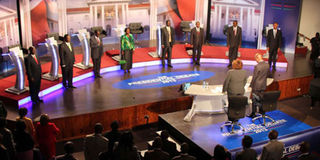Crowded podium will end up diluting Presidential Debate

Presidential candidates sing the National Anthem during the second edition of the Presidential Debate at BrookHouse School in Nairobi on February 25, 2013. In this year's debates, if I were to be asked, all those running under their parties or coalitions should debate on one podium. PHOTO | JOAN PERERUAN | NATION MEDIA GROUP
What you need to know:
- Ours is a democracy and everyone has a right to aspire for any political office in the land unless they are convicts.
- It would important to discuss whether these debates will make any difference in the forthcoming elections.
By last count, 18 individuals want to become the next President of the Republic of Kenya, including the incumbent himself and the leader of the formidable opposition coalition.
That President Uhuru Kenyatta wants another five years is not a surprise.
That Mr Raila Odinga wants to replace him at State House is not a surprise either.
LITTLE RECOGNITION
The surprise comes in the form of the 16 others with presidential aspirations, some of whom have had a run in the past, a little fun run, endeared themselves to Kenyans with their earthy wit, and then faded into oblivion.
Others have been in government, done this, gone there, but still want more of it.
But others do not even have name recognition — probably not even in their own counties — but they all still want to run for the presidency.
Good for them. Ours is a democracy and everyone has a right to aspire for any political office in the land unless they are convicts.
ORGANISING DEBATES
Quickly now, who is Nixon Kukubo? Joseph Musyoka? Stephen Amoko? Peter Osotsi? Joseph Ngacha Karani? Joseph Kaviinga? Erastus Nyamera?
None of these gentlemen is well-known, but any of them could become president, which is the beauty of democracy.
This is why we should get to know them on July 10 and July 24.
To dispense with the more immediate concerns, maybe the Debates Media Limited committee, which is organising these sessions, should tell us how they hope to accommodate all 18 aspirants on one podium and give each one enough time to expound on their agendas.
It is bound to be a logistical nightmare.
However, this body is composed of savvy media personalities who may already have found a way out.
OBJECTIVE
If I were to be asked, all those running under their parties or coalitions should debate on one podium and those running as independents on another.
This would mean, for instance, that President Kenyatta, Mr Odinga, Mr Ekuru Aukot, Mr Cyrus Jirongo, Mr Kennedy Mong’are, Mr Abduba Dida, and Mr Peter Ondeng could hold two sessions each, and the independents another two.
Then the debates by the running-mate could be dispensed with altogether.
In any case, by the end of four sessions, fatigue will have taken its toll and there is no point in inducing a countrywide yawn.
Having said all that, it would important to discuss whether these debates will make any difference in the forthcoming elections.
INFORMED CHOICES
I am not questioning the wisdom of allowing presidential contenders to answer questions on what they have done in the past or what they intend to do to make Kenya a better country.
The question is whether the debates will help Kenyans make informed choices on August 8, or change their minds about those choices.
I think the answer is self-evident, and this for two reasons.
First, very few people elect leaders because of their oratorical powers.
We have some potentially great leaders who can never be articulate, while others do not have an idea in their heads but they can be as eloquent as Barrack Obama.
Judging leadership qualities on that ground would be ridiculous.
Secondly, depending on the questions asked, any incumbent is at a disadvantage right at the outset because he has no choice but to be on the defensive; your failures will be pointed out but your successes can never be extolled.
We have some way to go and the debate about The Debates is just beginning, so let’s see how it all plays out.
****
Tomorrow, Kenyans mark the International Mother’s Day as they do every year — in complete ignorance.
Yet if they paused to think about it, they should celebrate the day with wild abandon.
That they don’t is puzzling, considering that even for adults, when anything untoward happens to them, the first person they think about is their mother.
This has baffled many fathers: Why would their children, especially boys, still run to Mama when they get into trouble and not to them even though they could also help?
The reason is simple; the bonding that occurs between a child and its mother in the womb, and the general nurturing functions, are a monopoly of mothers, something that fathers can never experience. End of story.
Let us celebrate our mothers today, for when, even as adults, we stub our toes, it is to them we still run for solace.





